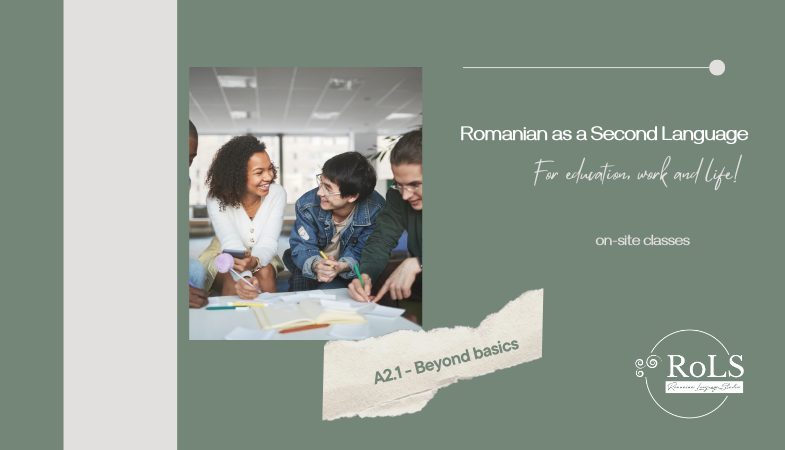
If you've already acquired the fundamental knowledge and skills in Romanian (covered in modules A1.1. and A1.2), we suggest moving on to module A2.1 – Beyond basics. This level primarily focuses on social interactions, including using basic polite greetings, engaging in short social exchanges, asking and answering questions about work and leisure activities, making and responding to invitations, and discussing plans and arrangements. By completing this module, you'll acquire practical skills for everyday situations like shopping, obtaining travel information, using public transportation, asking for directions, and buying tickets
Contents & abilities (for level A2.1)
A2.1 grammar & vocabulary:
- Brief everyday expressions in order to satisfy simple needs of a concrete type: personal details, daily routines, wants and needs, requests for information, basic sentence patterns and memorized phrases, groups of a few words and formulae about people, work, leisure, places, possessions, etc.
- More complex sentence structures, verb conjugation in present, past and future tense, modals, agreement, simple connectors (and, but, because, if), prepositions that require genitive, pronouns in accusative and dative, etc.
By the end of level A2.1, you’ll be able to:
- Describe people, living or working conditions, daily routines, likes/dislikes, etc., discuss abilities, preferences, and plans for leisure activities, give simple directions from place to place, present your opinion in simple terms, give a short, rehearsed, basic presentation on a familiar topic.
- Compose a sequence of simple phrases and sentences about personal topics (family, living conditions, education) connected by basic words like 'and,' 'but,' and 'because', write diary entries and story introductions/continuations with the assistance of reference materials.
- Understand phrases and expressions related to immediate needs (e.g. basic personal and family information, shopping, local geography, and employment), delivered in a clearly articulated speech, follow well-structured presentations on familiar topics, understand basic directions and instructions, and extract key information (weather forecasts, concert announcements, sports results) if spoken clearly.
- Grasp short, straightforward texts that feature the most frequent vocabulary, including some internationally recognized words.
- Engage in straightforward and routine tasks that involve a direct exchange of information on familiar topics related to work and leisure, and manage very brief, simple social interactions.
- Write short, simple formulaic notes on topics of immediate relevance, participate in basic social interactions online, sharing news, making plans, and commenting briefly on links and media.
- Use simple words to ask for explanations, recognize when difficulties occur and indicate in simple language the apparent nature of a problem, and convey the main points of short, straightforward conversations or texts on immediate relevance topics if they are expressed clearly.